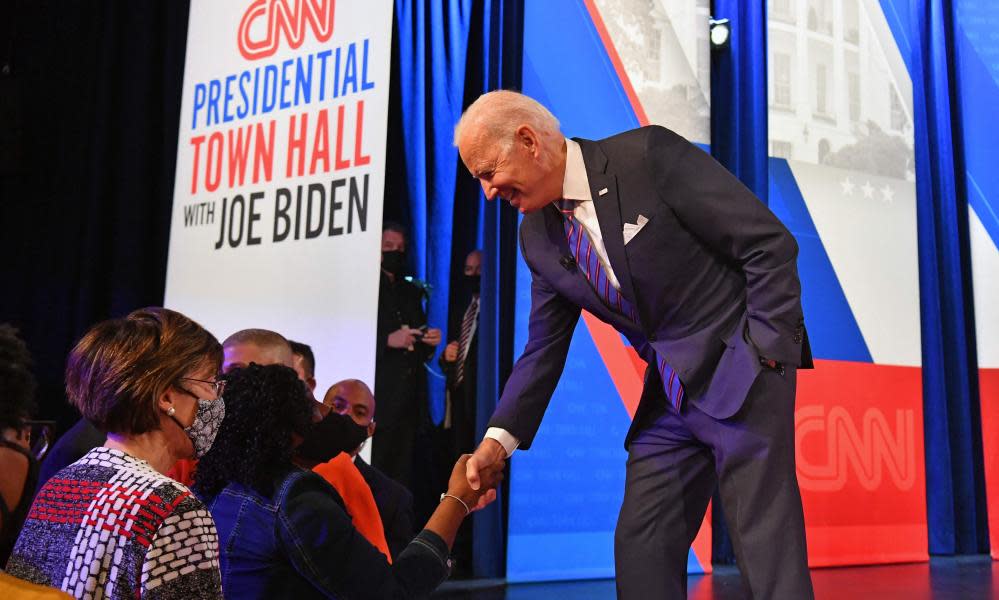Biden gives strongest signal he’s ready to move to end Senate filibuster

- Oops!Something went wrong.Please try again later.
Joe Biden has given the strongest indication yet that he is willing to end or whittle down the Senate filibuster as a means of overcoming Republican intransigence and moving ahead with reforms to voting rights, the debt ceiling and possibly more.
Speaking in Baltimore a day after Senate Republicans yet again blocked legislation designed to secure access to the ballot box for all Americans, Biden expressed mounting frustration at the filibuster, which effectively gives the conservative minority a stranglehold over large swaths of policy.
Related: Twitter admits bias in algorithm for rightwing politicians and news outlets
“We’re going to have to move to the point where we fundamentally alter the filibuster,” the president said.
At a CNN town hall in Baltimore on Thursday night, Biden hedged on how far any reform would go. “That remains to be seen,” he said, “in terms of fundamentally altering it or whether or not we just end the filibuster straight up.”
Asked by the moderator Anderson Cooper whether he would consider ending the filibuster on the issue of voting rights alone, Biden replied: “And maybe more.”
The filibuster has emerged as the rock upon which the ship of the Biden presidency could founder. The Senate mechanism locks in minority rule by allowing just 41 senators out of the 100 who sit in the chamber to block legislation.
The present Senate has a 50:50 split between Democrats and Republicans, though the Democrats hold the majority by dint of Kamala Harris, the vice-president’s, tie-breaking vote. Yet the Democratic agenda is still stymied across important areas of public policy by the filibuster, which requires Democratic whips to find 60 votes to pass legislation.
On Wednesday the Republican group led by Mitch McConnell applied the filibuster once more to hold back the Freedom to Vote Act. The bill would be the most significant overhaul in US election procedures in a generation, countering the wave of voter suppression measures that have been championed by Republicans across the states this year.
Progressive Democrats have been increasingly pressuring Biden to be more aggressive on the filibuster in order to secure fundamental reforms. But the president is in a tight spot given the resistance to change from within his own ranks.
Joe Manchin, the Democratic senator from West Virginia, and Kyrsten Sinema from Arizona, have both said they would oppose limiting the filibuster. Given universal Republican opposition to change, it would take a unanimous vote of all 50 Democrats to push this through.
Biden told the CNN town hall that entering into the hornet’s nest of the filibuster at this moment could make it harder for him to pass other pieces of signature legislation. “I lose at least three votes right now to get what I have to get done on the economic side of the equation, the foreign policy side of the equation.”
The president did not stipulate which three senators he had in mind.
Earlier this month the Democrats began focusing on the idea of scrapping the filibuster in the critical area of the debt ceiling. Republican opposition pushed the nation to the brink of defaulting on its debt, though McConnell backed down at the last minute.
Biden told the town hall that “the idea that, for example, my Republican friends say that we’re going to default on the national debt because they’re going to filibuster that and we need 10 Republicans to support us is the most bizarre thing I ever heard.”
He said that if a similar clash reoccurred, “you’ll see an awful lot of Democrats being ready to say, ‘not me. I’m not doing that again. We’re going to end the filibuster.’ But it still is difficult to end the filibuster beyond that.”

